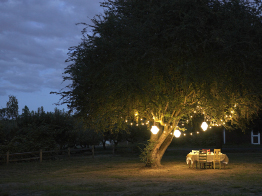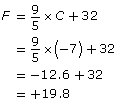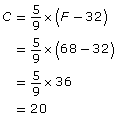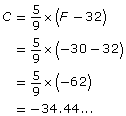Module 2
1. Module 2
1.24. Page 4
Module 2: The Imperial System
Bringing Ideas Together
Now you will bring the ideas from Get Started and Explore together to examine the Fahrenheit scale more closely.
The Fahrenheit Scale
The Fahrenheit scale was devised by Daniel Fahrenheit almost 300 years ago. Fahrenheit was a German instrument maker and scientist. He worked with a scientist in Denmark. Fahrenheit proposed that 0° on his scale would be the temperature of a mixture of ice, water, and certain salt. Fahrenheit used ammonium chloride rather than table salt. He thought the temperature of this mixture was the coldest temperature possible in Denmark.
Did you get a similar temperature for your mixture of ice, water, and table salt in Get Started?
Fahrenheit used body temperature as the next benchmark. He called that temperature 96°. He chose 96 instead of 100 because 96 could be divided by 12 just like the number of inches in a foot. Based on these benchmarks, the freezing point of water on this scale was 32°.
When his scale was revised, it was decided to keep 32° as the freezing point of water and make 212° the boiling point so there would be an even 180° between them! It is interesting that after this small adjustment, body temperature was not 96° as Fahrenheit wanted, but 98.6°.
The Fahrenheit temperature scale is a scale that sets the freezing point of water at 32°F and the boiling point of water at 212°F.
 Try This
Try This
In this activity you will establish more benchmarks on the Fahrenheit scale. You will use these benchmarks to become bilingual in Celsius and Fahrenheit!
TT 7. Use the Internet or other sources of information, including people you know, to complete the following chart.
|
Description |
Degrees Fahrenheit |
Degrees Celsius |
|
normal body temperature |
|
|
|
warm summer day |
|
|
|
room temperature |
|
|
|
pleasant spring day |
|
|
|
water freezes |
|
|
|
time to plug in the car |
|
|
 Share
Share
It’s time to share your answers to TT 7. Remember that sharing work is an important part of learning. Use the following tips to ensure you get all the benefits from this sharing opportunity.
- Complete the questions to the best of your ability. Make sure your answers are in a form that you can easily share with another student or with your teacher, if so directed.
- Use your class discussion area, or another method indicated by your teacher, to post your answers and to view the work of the people you’re sharing with.
- Compare your answers to the other posted answers. Identify where you have similar answers and where your answers are different. Discuss all differences between answers until you agree on the answers. If necessary, you may wish to involve your teacher in your discussion.
- Revise your answers where necessary.
Save a revised copy of your work in your course folder. Ask your teacher whether you should also save a summary of your discussion in your course folder.
Now with these benchmarks and your work in Explore, you are ready to convert between Celsius and Fahrenheit. Study these examples.
Converting Between Temperature Scales
Example 1

Ryan McVay/Digital Vision/Thinkstock
Last night the temperature dropped to 15°C. What is this temperature in Fahrenheit?
Solution
15°C is 15 Celsius degrees above freezing.
The Celsius degree is larger than the Fahrenheit degree.
There are 9 Fahrenheit degrees for every 5 Celsius degrees.
So, the number of Fahrenheit degrees above freezing is ![]() times the number of Celsius degrees.
times the number of Celsius degrees.
There are ![]() Fahrenheit degrees above freezing.
Fahrenheit degrees above freezing.
But freezing is 32°F.
So,
![]()
Therefore, 15°C is 59°F.
You could have done this problem in one step using the formulas learned in TT 6.
The formula is
Fahrenheit temperature = ![]() × Celsius temperature + 32
× Celsius temperature + 32
Note: This formula can be used regardless of whether the temperature is plus or minus!
This formula can be abbreviated as follows: ![]() .
.
So,
![]()
The temperature in Fahrenheit is 59°F.
Example 2
Use the formula to convert –7°C to Fahrenheit.
Solution

So, –7°C is 19.8°F.
Now, how would you convert Fahrenheit to Celsius?

© Lai Leng Yiap/15793094/Fotolia
Example 3
Convert 68°F to Celsius.
Solution
Celsius is the number of degrees above or below freezing.
Freezing is 32°F.
So, 68°F is 68 - 32 = 36 Fahrenheit degrees above freezing.
Remember, there are only 5 Celsius degrees for every 9 Fahrenheit degrees.
Multiply the number of Fahrenheit degrees by ![]() .
.
number of Celsius degrees above freezing ![]()
Therefore, 68°F = 20°C.
You could have done this problem in fewer steps.
Celsius temperature ![]() (Fahrenheit temperature –32)
(Fahrenheit temperature –32)
Note: This formula, just like the other, can be used regardless of whether the temperature is above or below zero!
This formula can be abbreviated ![]() .
.
So,

Therefore, 68°F = 20°C.
Example 4
The temperature last January in Minot, North Dakota, fell to –30°F. What was this temperature to the nearest tenth in degrees Celsius?
Solution

So, –30°F is approximately –34.4°C.
Use the interactive Temperature Conversion to confirm the solution to the previous example.
 Self-Check
Self-Check
You will now apply, in everyday settings, the formulas for converting between temperature scales.
Do the following questions and check your answers using the interactive “Temperature Conversion” that you accessed in Example 4.
SC 1. Martin has a fever of 101.3°F. How many Fahrenheit degrees above normal is his temperature?
SC 2. The coldest temperature in Canada was –63°C recorded on February 3, 1947, in Snag, Yukon. What is this temperature in Fahrenheit?

iStockphoto/Thinkstock
SC 3. The highest recorded temperature in Death Valley in the southwestern United States was 134°F reached on July 10, 1913. What is this temperature in Celsius? Round your answer to 1 decimal place.
SC 4. A recipe for Swiss steak calls for an oven temperature of 160°C. What would the oven setting be in Fahrenheit?
Oven Temperature Readings
Temperatures on the dials of older ovens in Canada and most ovens in the United States are in degrees Fahrenheit. SC 4 is interesting because 320, the oven temperature in Fahrenheit, is exactly two times 160, the equivalent oven temperature in Celsius.
320 = 2×160
This relationship can be used to convert between Celsius and Fahrenheit cooking temperatures. Even though for all temperatures other than 160°C this technique is just an approximation, it is close enough in the kitchen!
Example 5
A recipe for cookies calls for an oven temperature of 400°F. What is the approximate oven temperature in Celsius?
Solution
The Fahrenheit temperature is roughly twice the Celsius temperature.
400 = 2×200
So, 400°F is about 200°C.
 Self-Check
Self-Check
Do the following questions.
SC 5. A recipe for lasagna calls for an oven temperature of 175°C. What is the approximate Fahrenheit temperature?
SC 6. The directions on a package of frozen French fries states “Preheat oven to 450°F.” What would be the metric equivalent?
 Mastering Concepts
Mastering Concepts
If you have mastered the concepts in this lesson and would like a challenge, try these questions.
MC 1. Scientists state that the temperature at which molecular motion is at a minimum is approximately –273.15°C. What is the equivalent temperature in degrees Fahrenheit?
MC 2. Zero on the Rankine scale correlates to the Celsius temperature at which the molecular motion is at a minimum. Each degree on the Rankine scale is the same size as the degree on the Fahrenheit scale. What would body temperature be on the Rankine scale?
MC 3. On the Kelvin scale, the temperature at which molecular motion is at a minimum is set to be 0 K. Each degree on the Kelvin scale is the same size as the degree on the Celsius scale. Approximately what would body temperature be on the Kelvin scale?